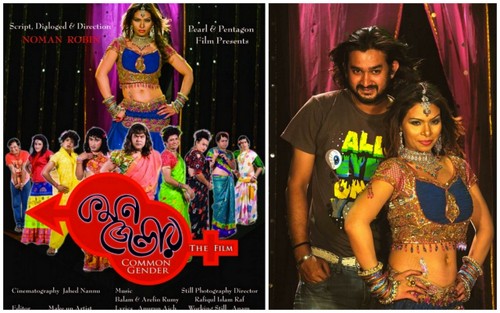
After Noman Robin witnessed, along with hundreds of others, the public beating of a transgender woman for using the women’s toilet in a shopping mall, he decided to make Common Gender, a new Bollywood film that’s taking Bangladesh by storm.
It was clear to Robin that there was an important story to be told: like so many queer folks, members of the “hijra” community are among the most marginalized in South Asia. Hijra, a word often mistranslated as “eunich” but which actually encompasses a wide variety of feminine-of-center identities, is often thought of as a “third gender.” Though they are accepted as a facet of society — traditionally they sing at births and weddings — their role doesn’t eclipse the widespread discrimination they face day-to-day.
Take, for example, the story of Mitra, recently detailed by the Global Post. Mitra, a member of the hijra community, has found it hard to escape the social stigma that comes along with her gender identity, even though she is educated and holds a degree in hotel management. “‘I was very happy, because I thought, “No one is going to keep me from getting a job.” But, much to my despair, I found that life was much more difficult.’ Hotel managers refused to give Mitra a job because she was a hijra and she was forced to turn to sex work to pay her bills.” Hers is a common story. In June, members of the hijra community came together at the first Hijra Habba to discuss shared issues, make demands of the Indian government–such as a third option for gender on legal documents–and to raise public awareness of their rights.
Enter Common Gender, a film centering around this marginalized but vocal community. The story follows Sushmita, a hijra who falls for a Hindu boy and suffers rejection by the boy’s parents. It’s a film without any star power and an “art-house” label, according to Enamul Karim, the film’s distributor.
I don’t know about y’all, but I anticipated this movie to go over like a greasy school lunch. I’m not the only one; the film’s distributor decided to contain the release to a mere six cinemas for the premiere two weeks ago. But guess what? The film’s playing to full houses and doing so well that cinema owners are extending its run and screening it nationwide. Karim also adds that an Indian producer has expressed interest in buying the film rights.

So far there’s no word on an international release, but if you’re in India, keep your eyes open for Robin’s coming-soon-to-a-theater-near-you smash hit. Could all of these events indicate a cultural shift for the hijra communities of India? I can’t wait to find out.








Comments
A cool article by a new contributor! It’s like Christmas! :D
(Also when do we get to read introductions!)
I’m looking forward to seeing this film as well, thanks Ali for writing about it. I do, however, have concerns from some of the clips I’ve seen that it falls into the mold of many other South Asian films which have used Hijra… being either campy comic relief or coming to a tragic end (and without giving away the plot of Common Gender, this film has both). Yes, I’m happy it’s a hit, but it’s still a film about this community as seen by a cis male director and seeing an act of violent transphobia doesn’t instantly mean you know anything about the community for which you might have compassion.
If anyone is really interested in Hijra, they should absolutely read the incredible book “The Truth About Me” by A. Ravathi (it’s in an English edition by Penguin). This is, to my knowledge, the only book by a person of this community speaking for herself and not ‘interpreted’ by outsiders (it’s translated from the original Tamil). It’s a fascinating first person view of Hijra communities, rituals, surgery, (yes) sex work, and relationships to family members. Moreover, unlike the character in the film, Ravathi is now part of an organization which is advocating for the rights of this population. She has some very interesting things to say about the entire “third gender” label. I have a review of it on my blog if you’re interested: http://skipthemakeup.blogspot.com/2012/01/first-person-true-hijra-life-story.html
Just added that sucker to mah goodreads. Thank you so much for the book recommendation!
Gina, this was really interesting from your blog post: “One way in which this book greatly differs from prior Hijra studies is that Revathi very much contrasts her view of herself as a woman with society’s view of her as ‘other’ or third gender. In many western-written books I’ve seen about Kathoeys or Hijra, there is a strong emphasis on them as third gender and not specifying whether that’s their own view of themselves or larger society’s box in which they’ve been placed.” I’ve noticed that too and have often wondered the same thing when I’ve come across writing on similar communities.
“This is, to my knowledge, the only book by a person of this community speaking for herself and not ‘interpreted’ by outsiders (it’s translated from the original Tamil)”
It is interpreted since it’s translated ;) If the translator’s an “outsider”, it can completely transform the book, especially if he or she isn’t receptive to different gender identities.
That said, I’m putting it on my books list!
yeah when you learn a new language you realise how faulty translation can be/ how hard it is to translate without losing the original meaning or voice
but i’ll still be reading ‘the truth about me’ as i’ve never seen anything concerning the Hijra community that wasn’t written from an outsider’s perspective before – which is so depressing
I wish I could hit the plus button on this a million times to agree. Language is so fun and funny! I’ll never forget reading En Attendant Godot in French. Beckett wrote both versions, and there’s still bits that are entirely different in flavor. I wouldn’t be able to spot anything like that in Tamil.
Just one other point about the film… the main actress playing the trans character is not trans, nor are most of the Hijra characters with speaking parts who are largely played by male comedians. There are some actual Hijra who are in the film as ‘window dressing.’ This doesn’t mean the film is necessarily bad or wrong-headed (a recent Iranian film called “Facing Mirrors” has cis actress playing a trans man and it’s a fantastic film) but it does make me suspicious as to how much input the Hijra community actually had in its production.
Hello, Bangladeshi here. From my experience with the culture, just *making this movie* is a pretty radical act, because of the major discrimination and harm that comes across people that don’t fit the status quo. It may have been hard (if not night impossible) to find a Hijra person willing to take on the lead role (and with that a lot of public scrutiny).
Also I’d just caution that “Hijra” and “trans” as envisioned by White Western culture don’t always equate neatly with each other, and I feel there’s this thing going on where White Westerners go “YOU’RE NOT AUTHENTIC ENOUGH! Because you don’t sound like what I expect authenticity to be!” towards people from other cultures talking about their own cultural experiences. (It was discussed recently by two Chinese-American chefs in relation to “authentic cuisine” but I can’t find the article now.)
Tiara, I’m not minimizing that the making (and even more, the distribution) of this film isn’t a positive radical step for Bangladesh’s film industry (Dhallywood, not Bollywood). It’s a big step forward and I applaud the director/producers for doing it.
What I do want to point out is that, sometimes, we think, well this is a film that’s made in a certain country about their minority population existing within their larger culture, (in this case) in Bengali by someone who seems sympathetic, therefore it’s an accurate representation of that minority. And that’s an often false assumption because it’s still very heavily filtered through the dominant culture, basically the same culture which is, for the most part, is still oppressing that minority. Even with the best intentions, some of those assumptions of that group will tend to be filtered into the final film. I think that’s universal to all countries.
And I totally agree with you that westerners shouldn’t be the final arbiters of what’s authentic in another culture any more than cis people should be the only ones to give ‘authentic’ portrayals of trans people’s lives. Ultimately, I want to hear what the community members are directly saying about who they are and their lives. From my experience (of course, filtered through my western eyes and ears) there is a lot more commonality between trans and gender variant people around the world than many anthropologists and academics want to ascribe even if much of the cultural context and dominant majority language used to describe them is different.
As to the actors, (and I don’t want to speak for the specifics of trans and gender variant people in Bangladesh vs. the rest of the region) there have been South Asian films made with the last 5 years which featured Hijra actors (I’m talking about films where Hijra play something other than prostitutes, thieves, kidnappers or clowns). The hit Tamil film Karumvai Pookal from 2 years ago used all Hijra performers in those roles. A successful Indian film called (in translation) “Queen” also used an all-Hijra cast. In both Pakistan and India, Hijra tv personalities have had their own highly successful tv talk shows. Trans people have played trans characters in leading roles in films from South Asia, Korea, Thailand, The Philippines, and Indonesia (and in a lot of Europe and South America) and, I dare say, that before those films were made, people from those countries would have given much the same explanation that you did as to why cis performers were used previously used to play trans and gender variant characters.
Ugh, early morning fog… last sentence should read: “as to why cis performers were previously used to play trans and gender variant characters.
I was woefully ignorant of both this film’s existence and the Hijra community before reading this, so thank you!
Even if this film doesn’t usher in a massive cultural shift, hopefully it’ll at least bring more awareness to these issues, and maybe even give those who are members of the Hijra community an opportunity to share their stories and experiences.
Bangladesh is a sovereign state located in South Asia. It is bordered by India and Burma and by the Bay of Bengal to the south. Bollywood is the informal term popularly used for the Hindi-language film industry based in Mumbai (formerly known as Bombay), Maharashtra, India.
The title of the movie being “Common Gender” and it being characterized as a “queer romance” really bothers me… A cis man with a trans woman is straight!
Great articles. I think it is encouraging to see films like this being made. I would love to see some about the discrimination, acceptance and lives of lesbian women in the sub-continent
Thanks & respect to above all friends. Basically its doesn’t important that the director of the movie should be a female or transgender or male. We are HUMAN. I feel them (transgender) as human rather then transgender. To communicate with mass audience
I had to apply some policy. But my motto was to carry a very important message “The man who exits between male & female is also a HUMAN”.
http://www.youtube.com/watch?v=sPJws0AXjuE
Thanks once again.
http://www.youtube.com/watch?v=UkO659yNQ3s
[…] Autostraddle tells us about the movie taking Bangladesh by storm: ‘Common Gender,’ a Bollywood film about a love story between a “hijra” and a Hindu boy. […]
The Lin of the Movie “Common Gender-The Film”
https://www.youtube.com/watch?v=CcHnxJny2Pg